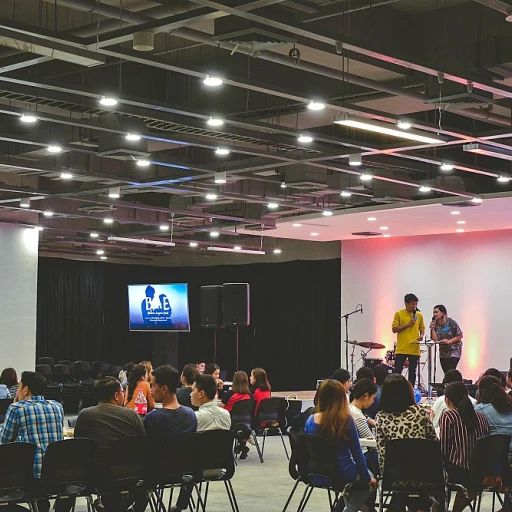
The Importance of HR Professionals in Modern Workplaces
The Unsung Heroes of Organizational Success
The role of human resource professionals is pivotal in shaping the modern workplace. These dedicated individuals are the unsung heroes who tirelessly work behind the scenes, ensuring the smooth operation of an organization. From recruitment to professional development, their responsibilities are vast and varied. They wear multiple hats, such as mediators, strategists, and advocates for employee engagement. In today's fast-paced work environment, HR professionals play a critical role in fostering a positive company culture. They contribute to creating a workplace where employees feel valued and appreciated. The establishment of a supportive environment not only enhances employee experience but also boosts overall productivity and teamwork. The necessity to appreciate the hard work and dedication of HR teams cannot be overstated. They are at the forefront of building company culture and advocating for employee rights. These professionals are tasked with addressing mental health issues, ensuring compliance with labor laws, and enabling staff development. Recognition of their efforts is not only crucial for morale but also for the growth and success of the organization as a whole. It's essential to recognize that every day, these professionals face numerous challenges in HR communication. Their effectiveness in addressing these issues significantly impacts the ease of professional development and the everyday lives of employees. Given the immense value they add, it’s only fitting that an appreciation day is celebrated in their honor. Learn more about the impact of ethical conduct on long-term organizational success and its connection to the fundamental role HR plays.Key Challenges in HR Communication
Recognizing and Addressing Common HR Communication Hurdles
In today's dynamic workplace environment, clear and efficient communication has become more critical than ever. HR professionals play a pivotal role in ensuring that messages are accurately conveyed and understood across the organization. Nonetheless, this isn't without its challenges. One primary challenge that HR faces is bridging the communication gap between top management and employees. Translating executive policies into digestible terms for all employees can be daunting, especially in large organizations where diverse teams require tailored communication approaches. This necessitates the development of customized strategies that cater to different departments, roles, and even individuals to ensure every team member feels valued and included. Another significant hurdle is promoting employee engagement while addressing their mental health and well-being needs. Considering recent shifts towards hybrid and remote work models, maintaining a sense of connectedness and appreciation is essential. HR specialists must strike a delicate balance between official communication and employee recognition initiatives, like professional days and appreciation days, to stimulate employee recognition and a supportive company culture. Additionally, with the rise of social media as a communication tool, HR departments need to skillfully manage the organization's online presence and messaging. This expands beyond traditional communication channels and requires constant vigilance and responsiveness to shape a favorable workplace environment. As we continue to observe these communication challenges in HR settings, it's vital to support HR initiatives that foster open dialogue, employee involvement, and professional development. By investing in these areas, organizations can nurture a work environment built on trust and transparency, ultimately empowering HR professionals to excel in their roles.Effective Communication Strategies for HR
Mastering Communication in Human Resources
In today’s evolving workplaces, communication plays a pivotal role in bridging gaps and enhancing employee experience. HR professionals are at the forefront, ensuring that messages are clearly conveyed, understood, and actioned upon. Effective communication in HR is more than just distributing information; it involves crafting messages that resonate with employees and align with the company culture.
Throughout the year, HR professionals manage various aspects of communication that impact the organization's health. To develop and nurture successful workplace relationships, it's crucial to focus on several strategies:
- Consistency and Clarity: Communication should be clear and consistent. Whether it’s about work schedules or company policies, clarity avoids confusion.
- Recognizing Employee Achievements: Utilizing platforms and forums where employees can feel valued and recognized fosters appreciation and encourages team building. Celebrations around Appreciation Day or Professional Day are opportunities to celebrate professionals and their hard work.
- Engagement through Feedback: Regular feedback ensures employees know their voices are heard. In modern organizations, feedback loops are essential, providing a platform for employees to express themselves.
- Leveraging Technology: Embracing technological tools enhances communication efficiency and effectiveness. Digital platforms enable quick dissemination of important information across the organization.
By employing these strategies, HR professionals can not only improve communication but also contribute to a thriving organizational culture where employees feel appreciated, engaged, and aligned with the company's goals and values. Building a culture of open communication is an ongoing process, requiring dedication and adaptation to new trends to meet the needs of the future workplace.
The Role of Technology in HR Communication
The Influence of Modern Solutions on HR Messaging
In today's fast-paced work environment, effective human resources communication is increasingly reliant on technology. The integration of advanced tools has transformed the way we connect within organizations, making all aspects of human interactions more efficient. The use of digital platforms enables HR professionals to keep employees informed, engaged, and appreciated year-round, not just on appreciation day or professional day. This continual communication helps build a cohesive company culture.
Employing social media and dedicated intranets as communication channels allows HR teams to disseminate information quickly and efficiently. The transparent sharing of milestones, professional development opportunities, and recognition of hard work can boost employee morale. By celebrating achievements and recognizing efforts, companies can foster an environment where employees feel valued.
The advent of mobile applications ensures that employees have immediate access to important updates, company events, and wellbeing resources, enhancing their overall employee experience. This is especially crucial as workplace flexibility becomes a norm across industries. Communicating effectively about mental health support and employee recognition can reduce burnout and improve overall employee engagement.
Additionally, leveraging analytics within communication tools can provide HR professionals with invaluable insights into the effectiveness of their strategies. These insights enable the continuous improvement of communication efforts, ensuring that messages resonate with the diverse needs of team members across an organization. Technology, thus, plays a pivotal role in advancing the mission of HR professionals, contributing to a thriving work environment where employees are motivated, recognized, and engaged.
Building a Culture of Open Communication
Cultivating a Transparent Dialogue
In an organization, building a culture of open communication plays a pivotal role in the well-being and engagement of employees. Professionals in human resources are instrumental in fostering an environment where team members feel valued and heard. It's crucial for employees to know that their voices matter and that their contributions are appreciated.
Fostering Appreciation and Recognition
Recognition of hard work is a cornerstone in creating a thriving workplace environment. Celebrating professional achievements through various means such as employee recognition programs, appreciation days, or even a simple shout-out on social media can significantly enhance employee engagement. Recognizing the efforts of HR professionals throughout the year reinforces their critical role and bolsters their commitment to nurturing a positive company culture.
Developing a Supportive Work Environment
Open communication also involves understanding and supporting the mental health of both HR teams and the broader employee base. Encouraging open dialogue about work-related challenges contributes to a nurturing work environment where resources and support are readily available. This inclusivity goes a long way in enhancing employee experiences and promoting overall well-being.
Promoting Continuous Professional Development
For human resource professionals, staying updated with the latest trends and strategies in HR communication remains essential. Employers can foster this professional growth by offering opportunities for team building and professional development, ensuring that HR initiatives align with the organization's goals while meeting the needs of the workforce.
In sum, creating a culture of open communication is more than just a strategy—it is an ongoing commitment to appreciate, develop, and celebrate the human element of every company. By doing so, organizations lay the groundwork for a successful, engaged, and satisfied workforce.













